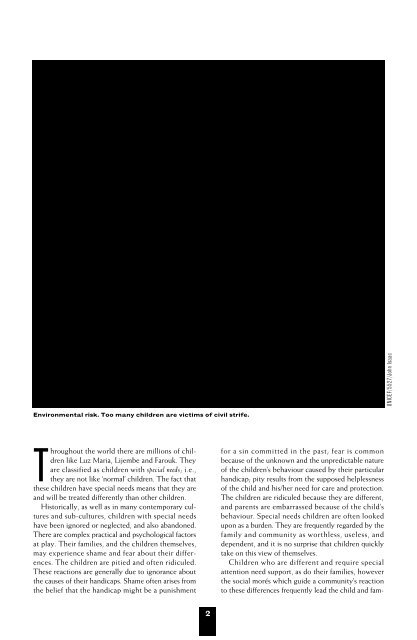Inclusive ECCD: - Consultative Group on Early Childhood Care and ...
Inclusive ECCD: - Consultative Group on Early Childhood Care and ...
Inclusive ECCD: - Consultative Group on Early Childhood Care and ...
Create successful ePaper yourself
Turn your PDF publications into a flip-book with our unique Google optimized e-Paper software.
UNICEF/5527/John Isaac<br />
Envir<strong>on</strong>mental risk. Too many children are victims of civil strife.<br />
Throughout the world there are milli<strong>on</strong>s of children<br />
like Luz Maria, Lijembe <strong>and</strong> Farouk. They<br />
are classified as children with special needs; i.e.,<br />
they are not like ‘normal’ children. The fact that<br />
these children have special needs means that they are<br />
<strong>and</strong> will be treated differently than other children.<br />
Historically, as well as in many c<strong>on</strong>temporary cultures<br />
<strong>and</strong> sub-cultures, children with special needs<br />
have been ignored or neglected, <strong>and</strong> also ab<strong>and</strong><strong>on</strong>ed.<br />
There are complex practical <strong>and</strong> psychological factors<br />
at play. Their families, <strong>and</strong> the children themselves,<br />
may experience shame <strong>and</strong> fear about their differences.<br />
The children are pitied <strong>and</strong> often ridiculed.<br />
These reacti<strong>on</strong>s are generally due to ignorance about<br />
the causes of their h<strong>and</strong>icaps. Shame often arises from<br />
the belief that the h<strong>and</strong>icap might be a punishment<br />
for a sin committed in the past; fear is comm<strong>on</strong><br />
because of the unknown <strong>and</strong> the unpredictable nature<br />
of the children’s behaviour caused by their particular<br />
h<strong>and</strong>icap; pity results from the supposed helplessness<br />
of the child <strong>and</strong> his/her need for care <strong>and</strong> protecti<strong>on</strong>.<br />
The children are ridiculed because they are different,<br />
<strong>and</strong> parents are embarrassed because of the child’s<br />
behaviour. Special needs children are often looked<br />
up<strong>on</strong> as a burden. They are frequently regarded by the<br />
family <strong>and</strong> community as worthless, useless, <strong>and</strong><br />
dependent, <strong>and</strong> it is no surprise that children quickly<br />
take <strong>on</strong> this view of themselves.<br />
Children who are different <strong>and</strong> require special<br />
attenti<strong>on</strong> need support, as do their families, however<br />
the social morés which guide a community’s reacti<strong>on</strong><br />
to these differences frequently lead the child <strong>and</strong> fam-<br />
2
















